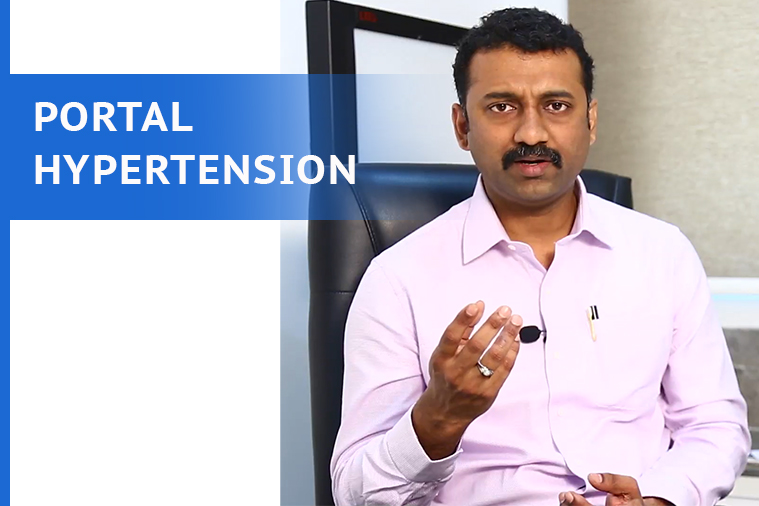Portal Hypertension
Portal hypertension refers to a condition where there is an abnormal increase in the pressure of the blood vessels in the abdominal organs.

What is Portal Hypertension?
The function of the portal system is to collect all the blood from the intestines along with the nutrients and toxins which come from food and deliver it to the liver. The liver then absorbs the nutrients and excretes the toxins .When the pressure in the portal vein increases due to various causes ,there is back pressure of blood on the abdominal organs and this causes trouble.
What are the Causes of Portal Hypertension?
There are many causes of portal hypertension. The most common ones are Cirrhosis of the Liver and Extra Hepatic Portal Vein Obstruction(EHPVO)
Cirrhosis is a condition where the liver instead of being a soft pliable organ becomes hardened. This makes it difficult for the blood from the portal vein to freely pass through the liver for filtration. This causes back pressure on the portal vein and causes portal hypertension. Cirrhosis can occur because of alcohol,viral hepatitis or advanced fatty liver.
EHPVO is a condition where there is a block in the portal vein due to a blood clot which prevents the blood from reaching the liver. This again causes back pressure leading to portal hypertension. The blood clot can occur as a result of some infection in childhood especially infection of the umbilical cord in newborns. It can also be the result of certain disorders of the blood where there is abnormally excess clotting.
Apart from these two conditions there are also numerous other rare causes. In certain individuals there is no identifiable cause for this problem.
What are the Symptoms of Portal Hypertension?
Because of the increased pressure of blood in the intestines there may be enlargement of the intestinal veins. These veins can sometimes burst causing sudden bleeding into the intestines causing blood vomiting or blood in stools. This can be a life threatening emergency in many cases.
Increased pressure of blood in the intestines can cause ooze of fluid into the abdominal cavity causing fluid accumulation or ascites. This is seen by a sudden increase in the width of the tummy.
There can also be an enlargement of the spleen due to back pressure of the blood in it causing an increase in the size of the organ called splenomegaly. This enlarged spleen can start eating the blood cells thereby causing a fall in the blood cell count especially the platelet count. A low level of platelets can cause abnormal bleeding from the gums or skin even after minor injury like brushing of teeth or a minor bruise.
How is Portal Hypertension Diagnosed?
The most common tests used to diagnose portal hypertension are an upper gastrointestinal endoscopy and ultrasonography of the abdomen. An endoscopy is done is done by passing a tube with a camera at its tip to examine the esophagus (food pipe) and the stomach. Presence of abnormally enlarged veins in these parts confirms the diagnosis of portal hypertension.
An ultrasonography is a simple test which can also be useful in diagnosing portal hypertension.
Apart from these there are also advanced tests which can further be used to identify the exact cause and the severity of portal hypertension.
What is the Treatment of Portal Hypertension ?
The treatment of portal hypertension is in two parts, one is the treatment of the complications of portal hypertension and the other is the treatment of the cause of the problem. The most important complication which needs effective control is bleeding. This is usually done by endoscopy.
The swollen veins are sealed using an injection with a sclerosant or tied off using a banding device. This achieves good control of bleeding in majority of the patients.
In patients where endoscopy fails to control the bleeding emergency surgery might be required.
In patients who have very severe portal hypertension not controlled by medicines or endoscopy ,a shunt may be needed.
Shunt can be created by angiographic technique called TIPPS or it can be created surgically. Both these methods have their own indications and outcomes. They are carefully chosen based on various parameters of the patients problem. In cases where the portal hypertension is due to cirrhosis liver transplantation remains the most effective way to cure the problem.



